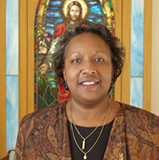Welcome!

Click here for more information
Christian Seasons
"Thanks be to God, who gives us the victory through our Lord Jesus Christ."
Until the 4th century, Easter and Pentecost were the only two holy days that Christians observed. Easter Sunday was the main day of celebration because belief in the resurrection of Jesus is the foundation of our faith. Easter was formally recognized by the Council of Nicea in 325. Pentecost Sunday (the birth of the Church) was also observed as a less important holy day, 7 weeks/49 days after Easter. Other occasions related to Easter were gradually added to the church calendar. They were:
Palm Sunday: The Sunday before Easter that recalls Jesus' triumphant entry into Jerusalem one week before his execution.
Holy Monday: Commemorates Jesus' cleansing of the temple. Some believe that this event triggered his arrest and crucifixion.
Holy Tuesday: Recalls Jesus' description to his disciples on the Mount of Olives of the destruction of Jerusalem.
Holy Wednesday: (Once called Spy Wednesday) recalls Judas' decision to betray Jesus.
Maundy Thursday: Commemorates the Last Supper, the agony of Jesus in the garden, and his arrest. "Maundy" comes from the Latin word "mandatum". Jesus mandated his followers to love one another (John 13:34-35). For centuries, people in authority have washed the feet of their followers on this day as a sign of their willingness to lovingly humble themselves before others.
Good Friday: Commemorates Jesus' death on the cross. The reason behind it being called "good" has been lost. Some claim that it is a corruption of "God" and that the early Christians called this day "God's Friday." Others claim that "good" refers to the blessings of humanity that resulted from Jesus' execution.
Holy Saturday: (or Easter Eve) is the final day of Holy Week and of Lent.
Easter Sunday: is the Day of Resurrection. In the early church, converts were baptized into church membership as a sign of their new life.
Ascension Day: (Feast of Ascension) is a celebration of Jesus' ascension which the book of Acts describes as 40 days after the resurrection.
Due to some practices with Easter which resemble the pagan festival of the vernal equinox, some think of the Easter celebration as merely a contrived holiday for people who want to believe the myth of resurrection. But those who know Christ, don't merely depend on the historical data to prove our Lord's victory over death. We know Jesus is alive through our faith and his work in our lives. That is the ongoing victory, and we as Christians can live out the joy of that victory each day. We don't have to confine our celebration of the resurrection to one week or one Sunday a year. We can live out the joy of the resurrection every day of our lives! Christ lives, because he lives in us!


